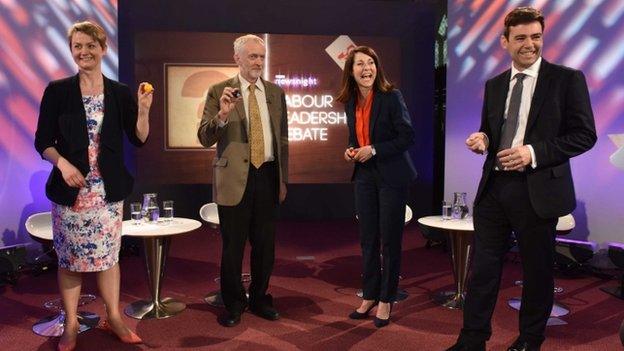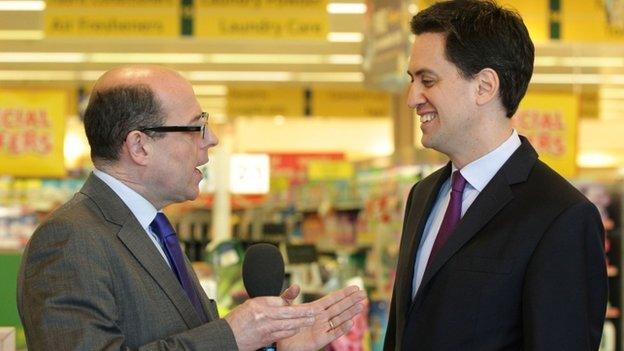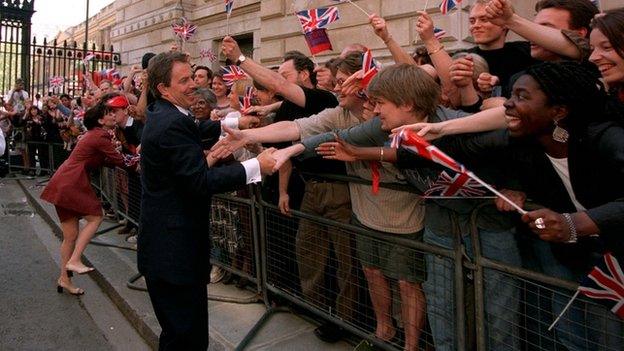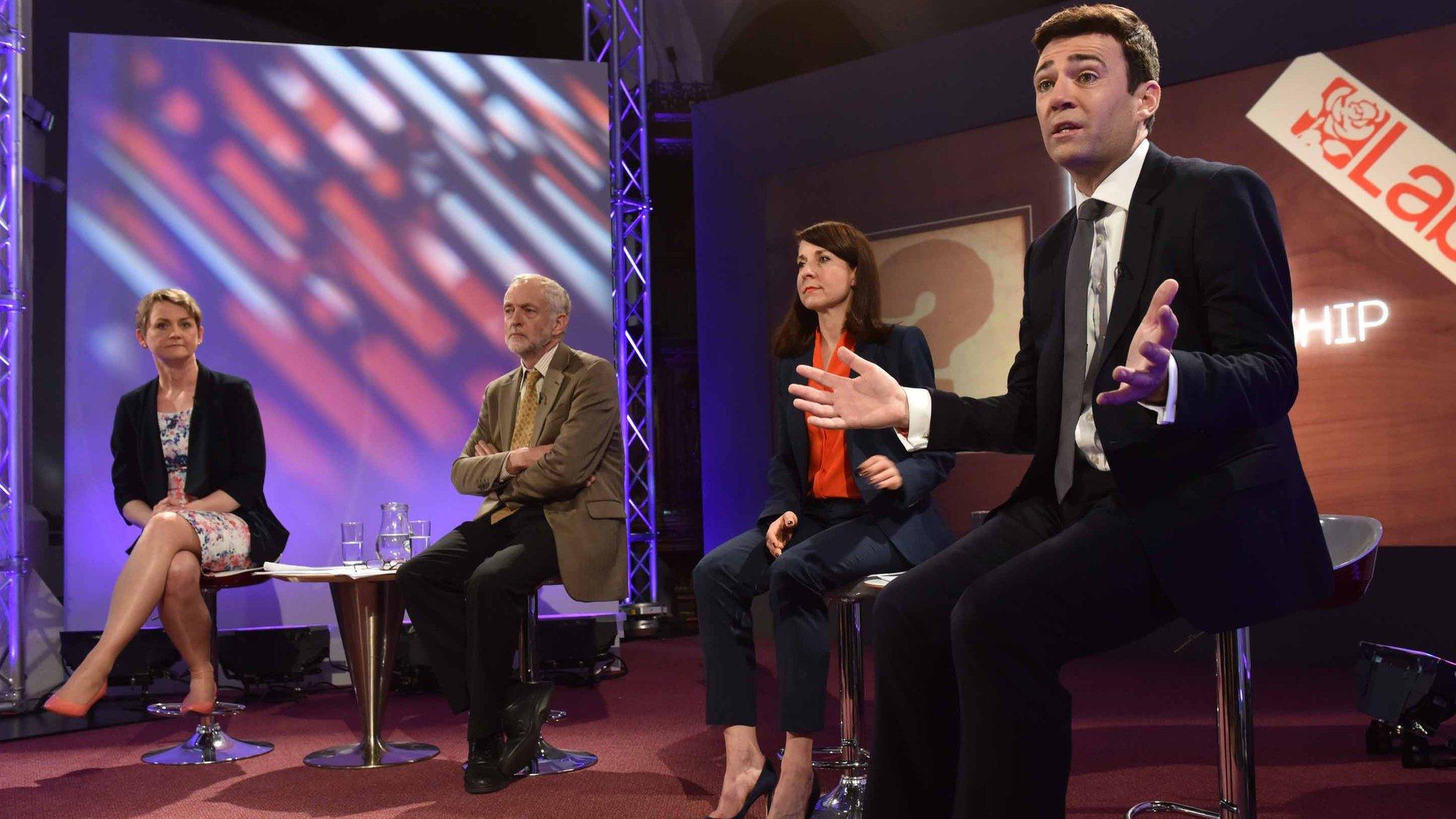Labour leadership: Missing - a big idea
- Published

"MISSING: A BIG IDEA. LOST BY LABOUR PARTY. IF FOUND PLEASE INFORM PARTY BEFORE SEPTEMBER. REWARD - POWER (MAYBE)"
Something was very obviously missing from last night's TV debate between the candidates for Labour leader. It was an election-winning 'Big Idea'.
By this I don't mean a headline-grabbing policy initiative, such as cutting tuition fees or introducing a 'Mansion Tax' to pay for increased health spending. The party just tried that and failed - spectacularly. I mean an over-arching critique of what's wrong with Britain and how Labour might put it right and of what's wrong with the party and how the next leader might fix it.
To be fair to Ed Miliband he had just such a critique when he became leader five years ago. Unregulated free market capitalism had failed, he believed. It had produced the worst financial crisis in decades, soaring inequality and the death of "the British dream" that your children and grandchildren would be better off than you were. We were living in a "zeitgeist" moment, when the public mood was ready to reject ideas of the past and embrace a "paradigm shift", an entirely new set of assumptions.
It was, in other words, Labour's equivalent to 1979 - the year Thatcherism was born. A copy of the Tory election manifesto from that year was kept in the Labour leader's office and regularly studied for inspiration.
Team Miliband's belief was that Thatcher and her followers had set an agenda - low tax, low regulation, a hugely increased role for the private sector, anti trade union etc - which Tony Blair's New Labour either embraced or were too terrified of the Tory press and the electorate to challenge openly.
They accepted that with little public money to spend the solutions would largely have to come from increased regulation of businesses rather than huge increases in public spending - hence the energy price freeze, the banning of zero hours contracts, the promise of hikes in the minimum wage and spread of the living wage and the promise of powers to make firms train their staff or hire apprentices. Regulation which, let's not forget, the opinion polls said was very popular.
This critique of Ed Miliband's was so deeply felt that he had been prepared to defeat his own brother who didn't and doesn't share it. In the face of terrible poll ratings and calls by other to change strategy he clung to his Big Idea in part, many close to him believe, because to do anything else would be to rip up the only rationale for his political fratricide.
His electoral strategy was almost entirely based on wooing all those on the centre-left who'd been alienated by Blairism - in particular former Labour voters who'd defected to the Liberal Democrats.

One reason I think that I got on with Ed was that I not only understood where he was coming from but again and again discussed with him the value of a big interview in which he would explicitly spell out his beliefs to the wider public. Again and again he shied away - fearful that if he compared himself to Thatcher it would alienate his own party or sound preposterous.
Crucial to who becomes the next Labour leader is what assessment the party now makes of EdMilibandism (a term which I think may just have had its first and last outing). There's been precious little of it evident so far in the leadership contest.
It is Jeremy Corbyn - the outsider, the candidate of the left, the man who's only on the ballot paper thanks to being nominated by MP who would hate him to actually become leader - who's come closest.
His critique is, in effect, that Miliband didn't have the courage of his convictions and was defeated by those who did - the SNP and the Greens - or by those who thought Labour and the Tories were essentially the same and who protested by backing UKIP.
Labour, goes this argument, promised a change of economic policy but actually stood on policies of smaller cuts or austerity-lite. The party pledged to end Blairite foreign policy adventurism whilst still embracing spending billions on renewing Trident.
Next nearest to a coherent critique is Liz Kendall. She is selling herself as the "tell it like it is, don't sugar the pill, leadership means challenging your own party" candidate. So she argues that Ed was wrong in his attitude to business, public spending, the use of the private and voluntary sector in public services and so on.
This has made it easy for opponents to accuse her of "swallowing Tory ideas and Tory myths" but, whisper who dares, on business and the deficit Andy Burnham and Yvette Cooper are now echoing her critique albeit in a much lower key way.
Yet just as Ed Miliband was frightened to talk openly about Thatcher, Liz Kendall is scared to do so about that other election winning but now toxic icon, Tony Blair. She tries to brush off allegations that she's really his chosen candidate by saying she's interested in the future not the past.
It won't work. If Labour is not prepared to embrace the successes of the Blair and, yes, Brown years (it was, remember, an incredibly successful joint enterprise for many years) they may struggle to win one, never mind, three elections in a row and she will certainly not win this leadership contest.

Blair led the Labour Party to three consecutive election victories
When under fire Blair used to enjoy asking "What have Labour ever done for us?" (a rip off of the famous Monty Python line about the Romans). He would then list the introduction of the minimum wage, tax credits, record investment in new schools, hospitals and children's centres and so the list would go on).
Listen now in Labour Party meetings and you'd be forgiven for thinking that all he ever did was invade Iraq and all Gordon Brown did was try to remove him from office before becoming the first leader who the party should have removed before he went on to lose an election.
Andy Burnham and Yvette Cooper are, whether they like it or not, part of that past. That's why Kendall uses the non-too subtle code of calling for a "clean slate". Bunham was a special adviser in the Blair years and then Brown's health secretary - something the Tories will never let him forget.
Yvette Cooper's record is less well known but the Conservatives will be quick to hold her responsible for many of the country's (and, incidentally, Labour's) problems. As Treasury chief secretary she managed public spending, as work and pensions secretary she was in charge of the benefits bill and, in opposition, she was the public face of Labour's immigration policy.
Yet they too seem frightened to address the past, openly preferring to talk about the mistakes of the past few weeks rather than analysing the roots of those mistakes which date back many, many years.
I may be wrong, of course. Perhaps Labour members will conclude that "that's enough Big Ideas, Ed". Perhaps they will decide that what really matters is that Andy Burnham is a working class lad who lives in Manchester and goes to watch football in Liverpool and is, therefore, not a member of the Westminster elite.
Maybe they'll conclude that Yvette has the edge as someone who looks and sounds and has the experience to be the next prime minister and not just a leader who knows where her party's "beating heart is".
Or will they decide that Liz Kendall, the plain-speaking girl from Watford, has that Blairite ability to refresh Labour in the parts of the country others simply cannot reach. It's even possible, I suppose, the party could elect Jeremy Corbyn - the man who couldn't even persuade 30 odd fellow MPs that he's the right guy for the job.
Or could it be that what they decide is that what's missing is a Big Idea and wait to see who comes up with one which might just win them an election?
- Published17 June 2015
